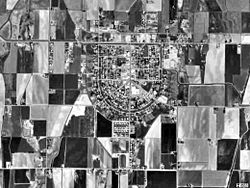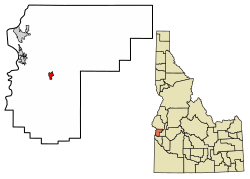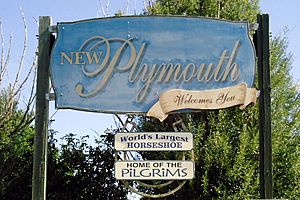New Plymouth, Idaho facts for kids
Quick facts for kids
New Plymouth, Idaho
|
|
|---|---|

Aerial view of New Plymouth
|
|
| Nickname(s):
World's Largest Horseshoe
|
|

Location of New Plymouth in Payette County, Idaho.
|
|
| Country | United States |
| State | Idaho |
| County | Payette |
| Incorporated | 1896 |
| Area | |
| • Total | 0.69 sq mi (1.78 km2) |
| • Land | 0.69 sq mi (1.78 km2) |
| • Water | 0.00 sq mi (0.00 km2) |
| Elevation | 2,257 ft (688 m) |
| Population | |
| • Total | 1,538 |
| • Density | 2,258.72/sq mi (872.62/km2) |
| Time zone | UTC-7 (Mountain (MST)) |
| • Summer (DST) | UTC-6 (MDT) |
| ZIP code |
83655
|
| Area code(s) | 208, 986 |
| FIPS code | 16-56980 |
| GNIS feature ID | 2411235 |
New Plymouth is a small city located in Payette County, Idaho. In 2010, about 1,538 people lived there. The city was officially started on February 15, 1896. New Plymouth is also known for hosting the yearly Payette County Fair and rodeo, which is a fun event for everyone. It is part of the larger Ontario, Oregon–Idaho area.
Contents
How New Plymouth Began: A Colony Town's Story
New Plymouth was not built like most towns. It was a "colony town," meaning it was planned and bought by a group of people before anyone even moved there. This unique idea came from a group called "The Plymouth Society of Chicago" in 1895. They were tired of busy city life in Chicago.
William Smythe's Vision for Irrigation
Another important person was William E. Smythe. He was a big supporter of irrigation, which is a way to supply water to dry land for farming. Mr. Smythe wanted to create a special colony to show how well irrigation could work. He traveled around, encouraging people to move west in groups and develop the land using irrigation.
He wanted this first colony to be named New Plymouth, just like the famous Plymouth, Massachusetts. He chose southwestern Idaho's Payette Valley because it had a great water supply from the nearby Payette River.
Designing the Town and Buying Land
The Plymouth Society of Chicago sent a team to check out the Payette River Valley. They decided this was the perfect spot for their new town. New Plymouth was designed in Chicago to be a self-sufficient town. It would rely on farming with irrigation and a strong railroad connection.
In February 1896, each person joining the colony bought 20 shares of stock. Each share cost $30. This gave them 20 acres (about 81,000 square meters) of land and a town lot. They were expected to clear the land and plant fruit trees, especially apples.
The Unique Horseshoe Shape
The town was laid out in a special horseshoe shape. The open end of the horseshoe faced north, towards the railroad and the river. This northern area was planned for factories and businesses. The land around the horseshoe was for homes.
People built their houses facing the street. The rest of their acre of land was for a garden, a family cow, or a horse team. Two streets, with a wide park in between, curved around the town in this horseshoe shape. This park and the streets around it were called "The Boulevard." The park was planted with grass and shade trees, making it a beautiful place.
Plymouth Avenue, the main street for businesses, ran down the center of the horseshoe. The community was first called the New Plymouth Farm Village. It was run by a special board until 1908, when it officially became a village and dropped "Farm Village" from its name.
New Plymouth's Location and Size
New Plymouth is located entirely on land. According to the United States Census Bureau, the city covers an area of about 0.69 square miles (1.78 square kilometers).
Who Lives in New Plymouth: A Look at the Population
The population of New Plymouth has grown over the years. In 2010, there were 1,538 people living in the city. These people lived in 565 homes, with 405 of them being families.
Population Details from 2010
- The city had about 2,229 people per square mile.
- Most residents (89.3%) were White.
- About 13.3% of the population was Hispanic or Latino.
- Nearly 30% of the residents were under 18 years old.
- The average age in New Plymouth was about 36 years old.
- The number of males and females was almost equal.
Fun Places to Visit in New Plymouth
New Plymouth has several interesting spots:
- Tuttle Blacksmith Shop: This is the oldest building in town.
- The Waterwheels: You can find these on Southwest First Avenue.
- Payette County Fairgrounds: This is where the annual fair and rodeo take place.
- Internet Truck Stops Headquarters: A local business landmark.
- New Plymouth High School: The local high school.
- Armoral Tuttle Public Library: A great place to find books and learn.
The Boulevard: A Unique Town Feature
The Boulevard is the main residential area and was part of the original town design. It's special for a few reasons:
- It's shaped like a horseshoe with a large park running down the middle.
- There's a system of ditches alongside the roads that connect to a canal. This allows landowners who pay for a share to get water for irrigation. This system dates back to when farming was common even within the city limits.
- Today, people use this water for gardening or watering their lawns.
- The west side of The Boulevard also has a frisbee golf course, which is a fun activity for residents.
See also
 In Spanish: New Plymouth (Idaho) para niños
In Spanish: New Plymouth (Idaho) para niños
 | James Van Der Zee |
 | Alma Thomas |
 | Ellis Wilson |
 | Margaret Taylor-Burroughs |


